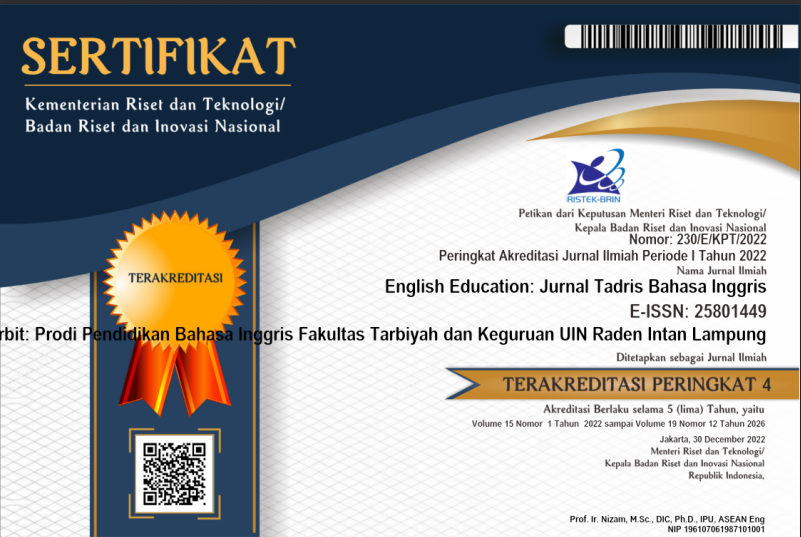Exploration Of Demotivating Factors in English Language Learning Moodle-Based: Comparison Online and Hybrid Learning
Abstract
Full Text:
PDFReferences
Abdullah, A., Talib, A., & Iskandar, I. (2021). Developing a hybrid learning model based on Moodle e-learning in Linguistics course. International Journal of Humanities and Innovation (IJHI), 4(2), 73–77.
Afshari, A., Tajeddin, Z., & Abbasian, G.-R. (2019). Sources of demotivation among English language learners: Novice and experienced teachers’ beliefs. Journal of Modern Research in English Language Studies, 6(4), 59–81.
Alizadeh, M., Mehran, P., Koguchi, I., & Takemura, H. (2019). Evaluating a blended course for Japanese learners of English: why Quality Matters. International Journal of Educational Technology in Higher Education, 16(1), 1–21.
llo, M. D. G. (2020). Is the online learning good in the midst of Covid-19 Pandemic? The case of EFL learners. Jurnal Sinestesia, 10(1), 1–10.
Arifin, M. (2020). The Effect of Blended Learning Model with Moodle on the Students’ Writing Achievement. IJEMS: Indonesian Journal of Education and Mathematical Science, 1(2), 100–110.
Bonta, E. (2019). Demotivation-triggering factors in learning and using a foreign language–an empirical study. Journal of Innovation in Psychology, Education and Didactics, 23(2), 177–198.
Bower, K. (2020). 2 How Can Learners Be Motivated in a Context of Demotivation for Foreign Language Learning? Curriculum Integrated Language Teaching: CLIL in Practice, 22.
Bülow, M. W. (2021). Designing synchronous hybrid learning spaces: Challenges and opportunities. Hybrid Learning Spaces. Springe.
Çankaya, P. (2018). Demotivation factors in foreign language learning. Journal of Foreign Language Education and Technology, 3(1), 1–17.
Chung, E., Subramaniam, G., & Dass, L. C. (2020). Online learning readiness among university students in Malaysia amidst Covid-19. Asian Journal of University Education, 16(2), 45–58.
Evans, M., & Tragant, E. (2020). Demotivation and Dropout in Adult EFL Learners. TESL-EJ, 23(4), n4.
Gamage, S. H. P. W., Ayres, J. R., & Behrend, M. B. (2022). A systematic review on trends in using Moodle for teaching and learning. International Journal of STEM Education, 9(1), 1–24.
Indriani, K. S., & Widiastuti, N. M. A. (2021). STUDENTS’ATTITUDE TOWARDS ENGLISH ONLINE LEARNING THROUGH MOODLE DURING THE COVID-19 PANDEMIC. Celtic: A Journal of Culture, English Language Teaching, Literature and Linguistics, 8(2), 190–205.
Ismail, H., Rahmat, A., & Emzir, E. (2020). The Effect of Moodle E-Learning Material on EFL Reading Comprehension. International Journal of Multicultural and Multireligious Understanding, 7(10), 120–129.
Kemdikbud, R. I. (2020). Keputusan Bersama Menteri Pendidikan Dan Kebudayaan, Menteri Agama, Menteri Kesehatan, Dan Menteri Dalam Negeri Republik Indonesia. Dk, 53(9), 1689–1699.
Khouya, Y. B. (2018). Students Demotivating Factors in the EFL Classroom: The Case of Morocco. Advances in Language and Literary Studies, 9(2), 150–159.
King, D. R., & Sizemore, A. E. (2020). Strategic management in online and hybrid courses. In Teaching Strategic Management. Edward Elgar Publishing.
Kozlova, Y., & Tryasak, N. (2021). Experience of moodle and online learning amid the covid-19 pandemic in pathological physiology department of SI “Dnipropetrovsk Medical Academy of the Ministry of Health of Ukraine.” Proceedings of the II International Education Forum «Best Educational Practices: Ukraine, Europe, World», January 24, 2021, Association for Promotion of Education and Science Globalization SPACETIME, 297–299.
Maican, M.-A., & Cocoradă, E. (2021). Online foreign language learning in higher education and its correlates during the COVID-19 pandemic. Sustainability, 13(2), 781.
Manan, N. A., & Rahmat, A. (2020). Moodle-Based Speaking Learning Model. Journal of Physics: Conference Series, 1477(4), 042009.
Mayer, R. E. (2019). Thirty years of research on online learning. Applied Cognitive Psychology, 33(2), 152–159.
Mumford, S., & Dikilitaş, K. (2020). Pre-service language teachers reflection development through online interaction in a hybrid learning course. Computers & Education, 144, 103706.
Natalia, K., & Julia, O. (2018). New use of MOODLE tools for distance English language learning (experience of Krasnoyarsk State Agrarian University). International Multidisciplinary Scientific GeoConference: SGEM, 18(5.4), 225–232.
Nurani, S. G., & Widiati, U. (2021). STUDENTS’PERCEPTIONS ABOUT THE ONLINE LISTENING COURSES DURING THE COVID-19 PANDEMIC. Celtic: A Journal of Culture, English Language Teaching, Literature and Linguistics, 8(1), 126–139.
Ora, A., Sahatcija, R., & Ferhataj, A. (2018). Learning styles and the hybrid learning: An empirical study about the impact of learning styles on the perception of the hybrid learning. Mediterranean Journal of Social Sciences, 9(1), 137.
Park, E., Martin, F., & Lambert, R. (2019). Examining predictive factors for student success in a hybrid learning course. Quarterly Review of Distance Education, 2, 11–74.
Pathan, Z. H., Ismail, S. A. M. M., & Fatima, I. (2020). English language learning demotivation among Pakistani university students: do resilience and personality matter? Journal of Applied Research in Higher Education.
Ranjha, M. I., Asghar, S. A., & Yasmin, S. (2021). Demotivating factors in the foreign language learning: An analysis of past studies. Pakistan Social Science Review, 5(3), 325–338.
Rizal, D. (2018). Hybrid Learning of Daviq. com in the Subject of Teaching Listening and Speaking. Vision: Journal for Language and Foreign Language Learning, 6(2), 194–208.
Santosa, I., & Riady, Y. (2021). Demotivating Factors of EFL Learners of Indonesian Undergraduate Students during Pandemic Covid-19: Gender Differences. Linguists: Journal Of Linguistics and Language Teaching, 7(1), 118–130.
Sellnow-Richmond, D., Strawser, M. G., & Sellnow, D. D. (2020). Student perceptions of teaching effectiveness and learning achievement: A comparative examination of online and hybrid course delivery format. Communication Teacher, 34(3), 248–263.
Siddqui, S., Soomro, N. N., Thomas, M., & Memon, R. M. (2021). IS HYBRID LEARNING A SOURCE OF SATISFACTION OR DISTRACTION? AN EXPERIMENTAL STUDY CONDUCTED IN THE LIGHT OF VROOM’S EXPECTANCY ELEMENTS.
Simbolon, N., & Simanjuntak, E. B. (2019). THE EFFECT OF HYBRID LEARNING METHOD ON TEACHER COLLEGE STUDENTS’READING SKILL. Jurnal Guru Kita, 3(3), 300–308.
Singh, V., & Thurman, A. (2019). How many ways can we define online learning? A systematic literature review of definitions of online learning (1988-2018). American Journal of Distance Education, 33(4), 289–306.
Siripol, P., & Wilang, J. D. (2021). Demotivation and coping strategies in synchronous online teaching. The Asian ELF Journal, 28(2.2), 7–23.
Tu, N. P., & Luong, T. K. P. (2021). Online language learning via Moodle and Microsoft Teams: students’ challenges and suggestions for improvement. Proceedings of the AsiaCALL International Conference-Atlantis Press, 533(978-94-6239-343–1), 106–113.
Wang, Y., & Guan, H. (2020). Exploring demotivation factors of Chinese learners of English as a foreign language based on positive psychology. Revista Argentina de Clinica Psicologica, 29(1), 851.
Yaure, R. G., & Schwab, J. E. (2018). Understanding the Student Experience in Online and Hybrid Courses to Improve Instruction. Family Science Review, 22(4).
DOI: http://dx.doi.org/10.24042/ee-jtbi.v16i1.15872
License URL: https://creativecommons.org/licenses/by-sa/4.0
English Education: Jurnal Tadris Bahasa Inggris, UIN Raden Intan Lampung is licensed under a Creative Commons Attribution-ShareAlike 4.0 International License. pISSN: 2083-6003, eISSN: 2580-1449.









